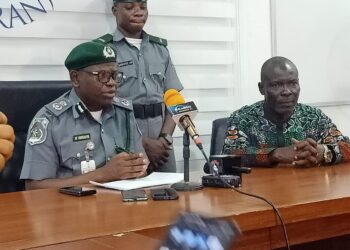The Nigerian Army has expressed serious concern over piracy in the Gulf of Guinea which it said posed a serious threat to the peace and stability of Nigeria as a sovereign nation.

The Chief of Training, Nigerian Army Headquarters, Maj.-Gen Okwudili Azinta, expressed this concern, on Thursday, in Kaduna, at the launch of a project on piracy in the Gulf of Guinea at the Martin Luther Agwai International Leadership and Peace Keeping Centre (MLAILPKC), Jaji, Kaduna.
The News Agency of Nigeria (NAN) reports that the MLAILPKC project was being carried out in collaboration with the Government of Japan, through the United Nations Development Programme (UNDP).
Represented by Maj-Gen Kabiru Muktar, the Commandant of the Nigerian Army School of Infantry, Azinta said that the initiative was a laudable effort at developing home-grown solutions to reduce the menace of piracy in the Gulf of Guinea.
He said that the formal launch of the project would herald its impressive objective and purpose, as well as serve to invigorate the existing cordial relationship with the UNDP and the Government of Japan.
Azinta explained that the objective was to fully institutionalise and build the training capacity of the MLAILPKC to conduct an anti-piracy course towards mitigating the negative impacts of piracy on maritime security, business and development.
“The objective is to also help the Centre achieve its peace support and operational mandates with a view to working towards ensuring that the centre continues to be the regional hub for anti-piracy training,” he said.
Azinta also noted that the Gulf of Guinea, which extends from Senegal in the West to Angola in the South, was a key shipping route for maritime businesses, including oil and gas, goods and services between the East and Western parts of the world.
He lamented the increasing number and severity of attacks on vessels by pirates in the region, posing a threat to global trade and the safety of seafarers operating in the region.
According to him, the International Maritime Organization and the International Maritime Bureau, which had been tracking piracy in the Gulf of Guinea for more than a decade now, had found that the region accounted for 95 per cent of all kidnappings at sea, with a record 130 crew members kidnapped during 22 separate incidents.
“In pursuit of this noble course and in line with the UN agenda for international peace and security, including the maritime domain, the Government of Japan through the UNDP sought to sponsor the institutionalisation of counter-piracy training with focus on Gulf of Guinea at this Centre,” Azinta said.
Earlier, in his address, the commandant of MLAILPKC, Maj-Gen James Ataguba, said that maritime crimes had been on the increase in recent years with most of them occurring in Nigeria’s territorial waters, and posing serious
threat to maritime trade and business.
“The project will contribute towards the achievement of the Goal 16 of the Sustainable Development Goal (SDGS) that aims at promoting peaceful and inclusive societies for sustainable development”, he said.
The UNDP Team Lead in Nigeria, Mr Martins Alao, also described the Gulf of Guinea as an important area to Nigeria, Africa and the world at large, because of the routes through which import and export businesses were carried out.
“The Gulf of Guinea is equally very important to the Government of Japan, being a key partner in the region, and which made them to put in money to ensure capability in Nigeria as one of the important countries to train in research and the root causes of piracy in the Gulf of Guinea”.
Gen. Martin Agwai (rtd), the Chairman, board of trustees of MLAILPKC, also stressed the importance of the Gulf of Guinea to global maritime activities.
“The Gulf of Guinea is actually important to the safety and development of our country; we are happy that the Nigerian and Japan Governments, through the UNDP, domiciled the research in the MLAILPKC and we are confident of coming out with positive results”, Agwai said.
















Discussion about this post